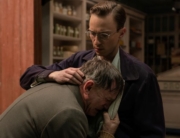Fabian: Going to The Dogs begins chaotically. The camera is often handheld, makes no secret of its presence, and sometimes comes uncomfortably close, and at strange angles, to the actors’ faces. The cuts are quick, sometimes intermixed with equally clipped sequences of archival footage and flash forwards, and a voice-over is inconsistently present. (The film is based on Erich Kästner’s 1931 novel Fabian: The Story of a Moralist.) The overwhelming stylistic influence seems to be that of the French New Wave—Louis Malle’s Zazie dans le Métro (1960) comes to mind—with spontaneous, on-location shooting, and a Brechtian flair for wearing the means of production on its sleeve.
I’ll admit I first recoiled pretty instantly, yet the film’s anything-goes attitude more or less won me over. For one, the stylistic flourishes calm down as the film proceeds, yet also, in this case, style is indeed wedded to subject. The film is set in Weimar–era Berlin (1931, specifically), a world of economic instability, wild partying, cabaret performers, rampant sexuality, and where Nazis are beginning to march the streets. It concerns a man in his early thirties, Jakob Fabian (Tom Schilling), his carefree, amoral beginnings as a directionless socialite who works in advertising, and how he becomes completely altered by the experience of meeting and falling in love with Cornelia (Saskia Rosendahl), an aspiring actress. Though the film never loses its spontaneous, jazz-like sense of unpredictability, it sobers and slows down as Fabian becomes more serious and transforms from someone who cares very little about others into someone who does. As such, though the movie is uneven (some episodes are much more compelling than others, and the overall chaos does take over, sometimes to the film’s detriment), it is nevertheless an affecting portrait of a time and place.
Fabian loses his advertising job pretty quickly (his proposals are too literary) and struggles to find work. He is writing a novel, but his actions are governed mostly by his relationships with Cornelia and his friend Stephan Labude (Albrecht Schuch). With Cornelia, he hopes to live his life with her. He buys her a dress he can barely afford and writes her a monologue for an important film audition. Though their affair is incredibly passionate, the compromises she needs to make for her career threaten to stand in their way. Labude, on the other hand, is a loose cannon—he has been left by his fiancée, who is sleeping with other men, and he seemingly moves between crises. Yet he is at work on a political treatise which imagines a perfect society, which is apparently promising, and Fabian has high hopes for him, even if his behavior is erratic. Labude is as likely to be found passed out in brothels as he is proselytizing to his fellow university students. Without giving too much away, this is a story of hope destroyed.
Though the wildness of its style is at times very effective, the episodic film is at its strongest in its embrace of eccentricity. This might come across in intimate scenes between Fabian and Cornelia, in which their behavior as lovers is playful and incredibly specific, or in the film’s embrace of Berlin’s cabarets, artist studios, and cafés, inhabited by lesbians, sexually voracious women, and those from the other side of the tracks. Many of the supporting characters are presented as fully-fledged with their own agency, making the world that vanished after the rise of the Third Reich utterly human.
Sometimes the style is just too much, and the film’s freewheeling nature can be fatiguing and disorganized. Not every tragic event has the impact it should, and it is easy to feel maddened and to lose one’s place in the narrative. Still, it is often as rewarding as it is challenging, and it is heartening to see a filmmaker so openly ambitious. If nothing else, this film will definitely be of interest to those fascinated by the Weimar Era, not to mention fans of Cabaret.







Leave A Comment